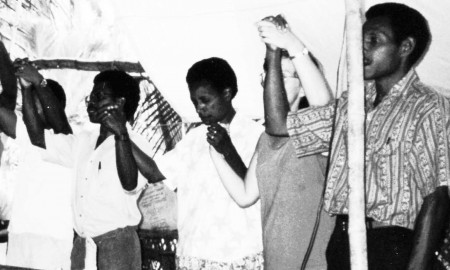by William Butler from the March 1996 issue of The Storyboard.
In early 1995 cancer was discovered in her body and even radical surgery did little to slow it down. Yet, in spite of the advancing cancer and pain, she spent the rest of the year continuing her ministry among women throughout the Churches of Christ. Though she had never had the opportunity for formal training, those who worked alongside her recognized her gifts for teaching, leading, and ministering to women. Even after surgery, as the cancer spread and pain became her constant companion, she never ceased using those gifts. She willed herself to carry on. She encouraged others. She led workshops to train others to minister, to have better families, to achieve their potential for God.
As her strength failed, there came a point when she could not leave her bed for long. So she wrote Bible studies and lessons to be used by others. Then she made sure her husband typed them, so that she would know they were finished before her death. She wrote good-bye letters to those missionaries who had encouraged and worked with her. She prayed, “Father, if you want me to live, it is up to you. This work you’ve given me is your work. You see that I am suffering greatly but this has not stopped me from doing your work. Please, Father, be gracious unto me, so that this hard work I have done does not come to nothing.”
At last she came to the hospital knowing she would never leave alive. That evening from her bed in the public ward, with her husband at her side, she began to loudly speak the Gospel to other patients, encouraging them to commit their lives to God.
Concerned about the possible repercussions of her actions, her husband told her, “Take it easy. This is a public hospital and the nurses and doctors will get upset with us.”
“I can’t stop,” she said, “There are people here who have never repented. I want them to hear about Jesus and repent. I want the nurses and doctors to hear too.” So she continued on.
After a while she confessed to her husband, “I’m afraid to die.”
He asked her, “Are you sure you are united with Christ and he is with you?”
“Yes,” she responded.
“Then there is no reason to be afraid,” he calmly reassured her. After praying together, her peace returned.
Soon she began to sing a chorus, “Jesus I want to go with you, Jesus I want to go with you, to Paradise, to Paradise. Paradise is my home.” She sang and witnessed to her fellow patients all through the night.
In the morning she was given some pain medication and taken for more tests. Soon after returning she called for her husband. With him at her side, she breathed her last. Anna Atibam was dead at 35.

But her witness was not over yet. Her husband and many others who saw her face as it was stilled by death noted the smile that was there and the glory of God that was upon her. And the ripples from her life and ministry continue to spread throughout the Churches of Christ and beyond.
How did she die? You could say, she died of cancer. But a more perceptive answer would be, she died victoriously. Like her namesake in the Scriptures, Anna, as faithful unto death. She could have chosen despair and self-pity but instead she chose to invest her final months in fulfilling the ministry God had given to her and her final hours to testifying to those in the hospital who needed Christ. How did she die? She died with the glory of God reflected in her face.
Anna Atibam was, at the time of her death on January 30, chairman of the Women’s Department of the Conference of the Churches of Christ in Papua New Guinea. Prior to assuming that role, she had served for 8 years as the Women’s Coordinator for the Churches of Christ in the Keram/Biwat area.
William Butler is the Bible translator for the Waran (Banaro) people of Papua New Guinea.
[ Editor’s Note: As I was searching our archives I was looking specifically for an article by William Butler. This was his first entry into The Storyboard. When I read the article I was stunned and shaken by the similarities between this story and the recent death of our Director, Eunice Messersmith. The sentences which brought fresh tears to my eyes were, “How did she die? You could say, she died of cancer. But a more perceptive answer would be, she died victoriously.” – Jan Messersmith ]